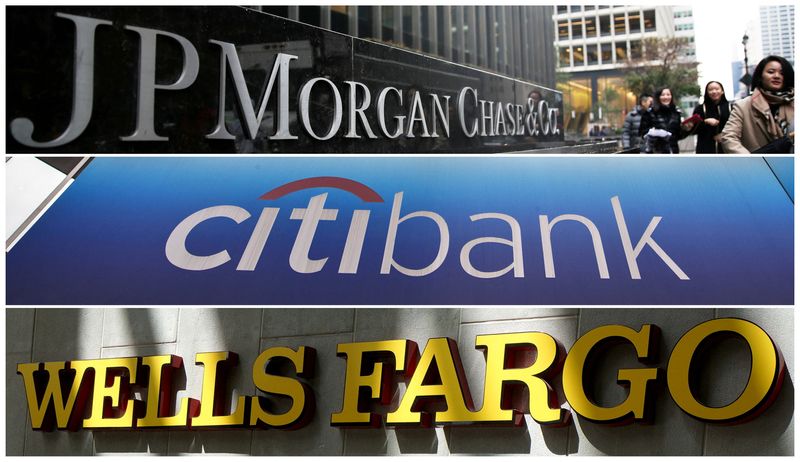NEW YORK (Reuters) – Swings in asset prices following Russia’s invasion of Ukraine could hit first-quarter profits at big U.S. banks depending on what happens before the end of the month and how markets react, analysts said.
Trading losses, provisions for expected loan losses, writedowns of assets and charges for closing businesses could muddy what was expected to be an OK quarter as banks benefited from higher interest rates and more lending even as the flood of investment banking revenue subsided.
Big banks could take one-time hits totaling $5 billion, or twice that, or none at all, said Gerard Cassidy, an analyst at RBC Capital Markets.
“You really can’t say because markets are moving in such a volatile fashion depending on what’s going on with the geopolitical risks,” he said.
The market volatility has been the bad kind for securities dealers, with prices jerking up and down rather than moving steadily as can happen when interest rates are expected to rise or fall, analysts say.
“The next two weeks could make or break near-term results,” analyst Jason Goldberg of Barclays wrote on Friday.
Large U.S. banks start reporting earnings on April 13.
Goldberg cited comments by the markets chief for JPMorgan Chase & Co on March 8 that quarterly revenue had become unpredictable because of “significant counterparty risk” and “a lot of clients” being under extreme stress, particularly from commodities trades.
Those risks were cited on Friday by bond-rating firm Standard & Poor’s in a report on the potential impact of the conflict. S&P also warned of new operational problems in complying with sanctions and increased cyber risk.
So far, Citigroup Inc stands out most as likely to report a significant hit. Apart from market exposures, its consumer bank in Russia could cause losses.
CITI BUYBACK PLANS UNDER THREAT
Citigroup said on March 2 that in “a severe stress scenario” it could be exposed to nearly $5 billion of losses from its Russian businesses.
The bank has enough excess capital to handle that without serious damage, analysts said. But a hit could slow its share buybacks – a key part of Chief Executive Jane Fraser’s plan to lift the bank’s valuation.
Citigroup’s shares trade for less than the company’s net worth and re-purchasing them would add value.
The fallout from Russia’s invasion of Ukraine, which Moscow calls a “special military operation”, and subsequent sanctions, has intensified since the bank first guided on potential losses.
Whether events point to a $2 billion or $4 billion hit for Citigroup in the first quarter or a different sum spread over the year is impossible to determine, analysts said.
“The hard part for us with Citi right now – and it’s probably difficult for them, too – is how big of a writedown is needed,” said Cassidy. “Writedowns are coming. We just don’t know yet how severe.”
Analysts were expecting Citi to earn $13.7 billion this year, according to data from Refinitiv I/B/E/S, so Citigroup should still be profitable this year even with a $5 billion charge.
Few analysts have updated their estimates for Citigroup since March 4. Many may hold back estimates for big banks until the quarter ends.
By then markets may have turned and more banks may have disclosed consequences of the war and sanctions.
Bank of New York Mellon Corp said on Thursday that pulling out of Russia would cost it $100 million in lost revenue in the first quarter. Depending on the final accounting, that could reduce its earnings by 10% from current estimates, according to Barclays’ Goldberg.
Some analysts did not want to be quoted about changes they will make to their first-quarter estimates. “We will have to plug in some number for what provisions will be,” one said.
(Reporting by David Henry in New York; Editing by Matt Scuffham and Matthew Lewis)























